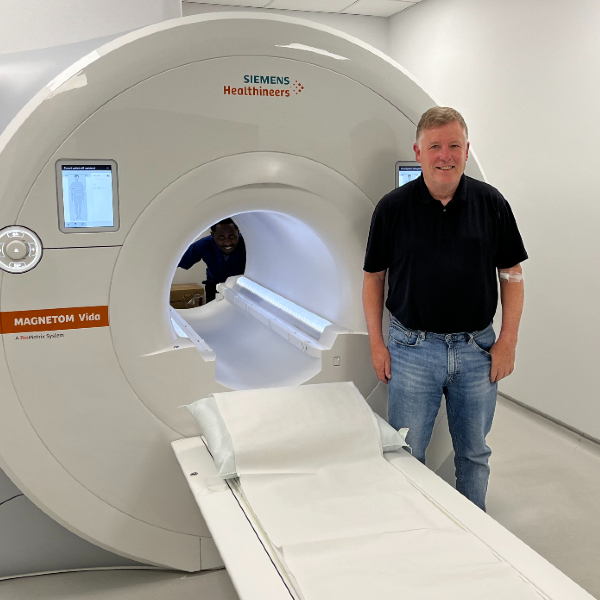Early Detection of Heart Failure – “I now know the condition of my heart and what Heart Failure is…”

The Health Innovation Accelerator is focused on rapidly improving diagnosis and treatment in disease areas where early diagnosis can improve outcomes and save people’s lives – including heart failure, liver disease, lung cancer, and respiratory conditions.
Communities across the UK are seeing cases of Heart Failure (HF) rise significantly, with Greater Manchester at higher risk than other UK areas. The disease is an escalating health problem across the country which is estimated to affect approximately 1-2% of the adult population.
To tackle this growing health issue the Early Detection of Heart Failure project – delivered as part of the Health Innovation Accelerator – is developing a new and innovative approach to detecting patients at increased risk of heart failure across the region, and to help solve significant challenges for the treatment of this disease. The programme also aims to tackle health inequalities, by recruiting a diverse cohort of patients including those who are from socio-economically deprived and ethnically diverse backgrounds.
The project, led by Dr Nicholas Black, Cardiology Clinical Research Fellow at Manchester University NHS Foundation Trust (MFT), is recruiting people from across Greater Manchester to attend Wythenshawe Hospital, part of Manchester University NHS Foundation Trust (MFT), for blood tests and a Cardiac MRI (Magnetic Resonance Imaging). The patient’s health care journey is then monitored for the next five-years.
Eric’s experience – “Having knowledge of how your heart is working can only help…”
Eric, aged 71 from Irlam in Greater Manchester, is a member of the Health Innovation Manchester Patient and Public Involvement and Engagement (PPIE) panel. He was made aware of the Early Detection of Heart Failure project and decided to find out more about how he could get involved in the study.
Following a consultation with the research team, Eric realised that he qualified for the study at Wythenshawe Hospital and booked an appointment to attend in June 2024. The criterion for this testing is that a patient must be over the age of 50, with health issues such as high blood pressure or high cholesterol and must reside in Greater Manchester.
Eric explains: “Taking part in this piece of research was straight forward, it was easy to do, and it didn’t take long. I went into the hospital with my wife for a 2pm appointment – the whole thing took an hour and five minutes, and then we spent about ten minutes talking to Dr Black who explained exactly how my heart was operating. I asked him if this was the normal process and he said that it absolutely was. So, if anyone does want to take part in this research, that’s what you can expect; allow for a couple of hours for the whole thing and then you’re home and dry.”
Eric has a history of heart attack in his family and wanted to understand his own health and to help to contribute to this research project, for the benefit of communities across Greater Manchester.
Eric said: “I wanted to help actually – that was the first thing – I wanted to take part in research that might improve the lives of people in Manchester, and that’s because I know that heart failure is an issue for our region.”
As part of the testing Eric had an Electrocardiogram (ECG) scan to check his heartbeat and had an MRI scan which produced detailed imaging of his organs, with results presented to Eric afterwards.
Eric told us: “They explained completely about my heart, the condition of my heart and he explained what heart failure is compared to heart attacks and also gave me an insight into the piece of research.
“I say to people with certain underlying issues and you do have to have those to qualify for the piece of research, anyone who has those and regardless if you’ve got a healthy heart or not healthy heart, I would so go for it.
“You’re helping other people in the Manchester area and you’re learning more about yourself and about your own situation. Having a bit of knowledge about your own situation, on how your heart is performing can only help you. In my particular case my heart was functioning normally, but they also told me that my high blood pressure is having an adverse effect on one of the chambers – it wasn’t serious but nevertheless it showed up and consequently this research can inform my GP.”
To find out more about Early Heart Failure study and to register your interest in taking part in this study, please visit the website here.
Further information about the Health Innovation Accelerator:
The Health Innovation Accelerator has been established to rapidly improve the diagnosis and treatment of disease across the 2.8m Greater Manchester population.
The Accelerator encompasses two projects, the Advanced Diagnostics Accelerator and the DEVOTE programme, delivered through a partnership between Health Innovation Manchester, Manchester University NHS Foundation Trust (MFT), The University of Manchester, and industry partners.


